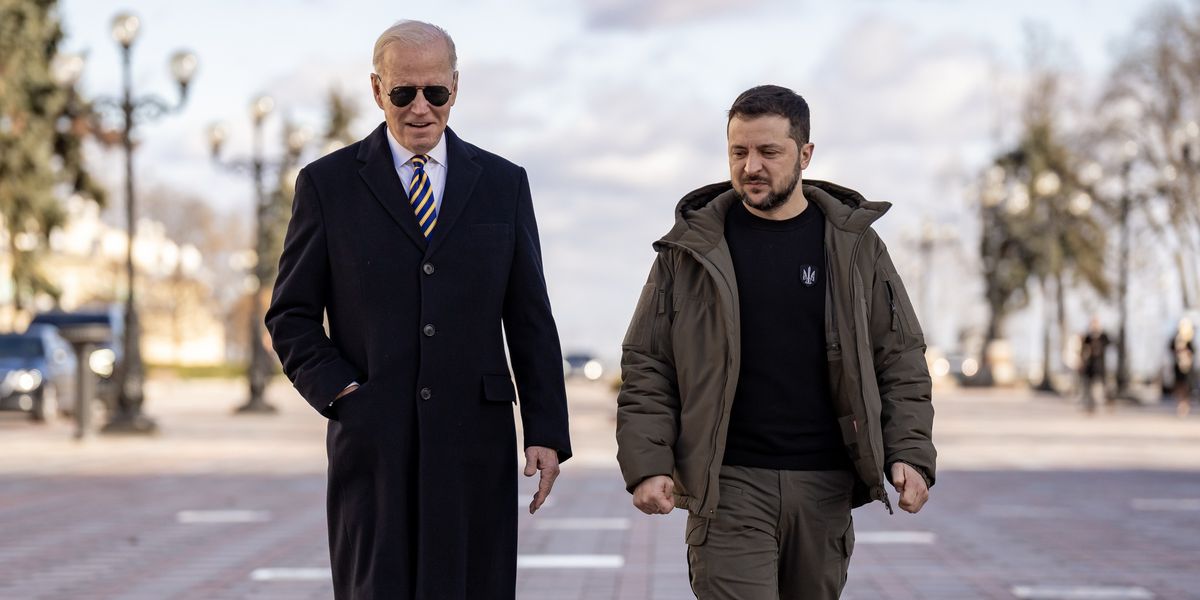The Biden administration issued a stark warning to House and Senate leaders on Monday, telling them that U.S. aid for Kyiv would run out by the end of 2023 if Congress does not pass the White House’s proposed emergency supplemental package, which includes about $61 billion for Ukraine.
“We are out of money to support Ukraine in this fight. This isn’t a next year problem,” concludes a letter sent by Shalanda Young, the director of the Office of Management and Budget. “The time to help a democratic Ukraine fight against Russian aggression is right now. It is time for Congress to act.”
Aid for Ukraine has been hanging in the balance since Republicans took control of the House in January of this year, with assistance for Kyiv being left out of two short-term government funding packages.
Despite the urgent tone in the OMB’s letter, it isn’t quite clear how much money is left in the coffers for Ukraine. As RS’s Connor Echols reported in October even the chair of the Senate Intelligence Committee admitted at the time that he did not have “100% clarity” on what remained.
Nevertheless, Young’s letter claims that the Department of Defense has spent 97% of the funds it has received from Congress to date, and that the State Department has exhausted the $4.7 billion it has received for military assistance.
Young argues that the remaining funds are rapidly running out.
“Cutting off the flow of U.S. weapons and equipment will kneecap Ukraine on the battlefield, not only putting at risk the gains Ukraine has made, but increasing the likelihood of Russian military victories,” reads the letter. “If our assistance stops, it will cause significant issues for Ukraine. While our allies around the world have stepped up to do more, U.S. support is critical and cannot be replicated by others.”
The OMB director also doubled down on the Biden administration's recent pivot that funding Ukraine’s defense is also a boon to American jobs. “While we cannot predict exactly which U.S companies will be awarded new contracts, we do know the funding will be used to acquire advanced capabilities to defend against attacks on civilians in Israel and Ukraine — for example, air defense systems built in Alabama, Texas, and Georgia and vital subcomponents sourced from nearly all 50 states,” Young wrote.
As the Quincy Institute’s Bill Hartung recently wrote in RS, foreign military aid is not an effective jobs program. “There are many ways to create more and better jobs without resorting to increased weapons spending,” said Hartung. “Virtually any other form of government outlay, or even a tax cut, yields greater employment than military spending.”
Despite the Biden administration’s urgent plea, a series of obstacles stand in the way of the supplemental appropriations making their way to the president’s desk.
In the Senate — which has overwhelmingly supported Ukraine aid so far — negotiations over the spending package are reportedly held up by disagreements over border security, which Senate Republicans maintain must be included in the final language. Politico’s Burgess Everett reported on Monday that talks have “moved in the wrong direction” in the last week, with some Democrats saying talks have fallen apart.
Even if the Senate manages to reach a compromise, the path promises to be more complicated in the House, where a growing number of Republicans are skeptical of how money is being spent and whether the Biden administration has a strategy for bringing the war to an end. A number of House Republicans have pledged to oppose what they consider another “blank check” for Kyiv.
Like his predecessor Kevin McCarthy (R-Calif.), new House Speaker Mike Johnson (R-La.) has sent mixed messages on his stance. As a rank-and-file member, Johnson consistently voted against further funding for Ukraine, but his rhetoric since assuming the Speakership suggests a change in opinion.
In late November, he said that he was “confident and optimistic” that Congress would be able to get a package that includes aid for Ukraine and Israel as well as funding for border security “over the line" before the end of the calendar year.
"Of course, we can’t allow Vladimir Putin to march through Europe, and we understand the necessity of assisting there," he added at an event in Sarasota, Florida. "What we've said is that if there is to be additional assistance to Ukraine, which most members of Congress believe is important, we have to also work in changing our own border policy."
But Johnson also reportedly recently warned Senators that he does not have the votes in the House to pass Biden’s supplemental package. More than 100 House Republicans voted against the last Ukraine aid package, and counting on Democratic votes to pass controversial legislation could have political consequences for the Speaker.
Despite these hurdles, Senate majority leader Chuck Schumer (D-N.Y.) maintains that he wants to bring the package to the floor this week. Sen. James Lankford (R-Okla.) has said he would filibuster the legislation if no border deal is reached.
- GOP hawks slam Biden, say he has ‘no strategy’ for Ukraine ›
- What will new Speaker Johnson do about Ukraine-Israel aid? ›















